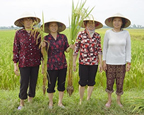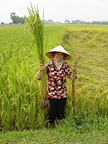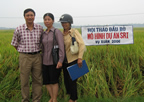VIETNAM SRI ARCHIVES (2003-2009)
|
||
|
||
Activity Archives (2003-2010)
(See main Vietnam page for 2011-2013 progress)2010
-
SRI Represented at 3rd International Rice Congress and Associated SRI
Events in Hanoi during November 2010
The 3rd International Rice Congress, held at the Hanoi Convention Center on November 8-12, 2010, included a number of oral presentations and posters about SRI. In addition, Norman Uphoff discussed SRI while participating in the opening plenary panel. On November 8, Oxfam America and the Plant Protection Department of the Ministry of Agriculture and Rural Development (MARD) co-sponsored a pre-conference 'SRI Day' at the Hanoi Hotel. The presentations from this one-day event, the International Conference to Exchange Experience in Adoption and Adaptation of the System of Rice Intensification, are available on the SRI-Rice website. Mr. Ngo Tien Dung, Deputy Director General of the Plant Protection Department (PPD), Ministry of Agriculture and Rural Development (MARD), made a presentation on SRI Application in Vietnam.
Oxfam America and MARD also sponsored a field trip the day after the close of the Congress to meet with SRI Farmers in the commune of Mr. Le Thach, President of Dai Nghia Cooperative in Ha Noi Province. Le Thach recently traveled to Washington, D.C., to participate in the October 20 event Farmers Leading the Way from Crisis to Resilience, which was sponsored by Oxfam, WWF and Africare.
-
ICC Project on SRI Wins Vietnam Innovation Day Award
Dr. Hoang Van Phu, director of the International Cooperation Center (ICC) at Thai Nguyen University, reports that ICC is among the winners of the 2010 Vietnam Innovation Day for its project entitled "Improvement of people's awareness on environment protection by application of system of rice intensification - SRI." The project, one of 262 entries, will begin in June 2010 and end in February 2011. ICC is preparing a new training project that will be submitted the to Belgium Development Agency (BTC Vietnam) with the proposed title "Training course of Improvement of People's awareness on environment protection by application of system of rice intensification - SRI."
-
SRI Workshop Reports on
Use of SRI Methods in 21 Northern Provinces in Vietnam
A National Workshop on Consolidation of SRI Experiences, Lessons and Networking took place in Hanoi, attracting nearly 100 participants from Vietnam and Cambodia. Representatives of government, NGO, university and farmer organizations working with the System of Rice Intensification in Vietnam gathered on January 21 for a two-day exchange, co-organized by the Plant Protection Department of the Ministry of Agriculture and Rural Development (MARD) and Oxfam America (workshop presentations are available from an article on the SRI in Vietnam website).
Ngo Tien Dung, head of the National IPM Program of the Plant Protection Department, and Brian Lund, regional director for Oxfam's East Asia program, reported on the progress of a SRI programme that is being jointly carried out in Vietnam with the Centre for Sustainable Rural Development, faculty at the Hanoi Agriculture University, and Oxfam Quebec. Dung reported that farmers in 21 northern provinces had adopted SRI methods, wholly or in part, on 10% of the total rice growing area. MARD data in Dung's PowerPoint presentation showed that in 2009, 440,833 farmers used SRI methods on 232,365 ha. It was reported that 20% of the farmers were using the full set of SRI practices, and the rest were using most if not all, but still getting benefits of higher yields with lower cost and less water usage.
Application of SRI practices is calculated to have helped rice farmers earn 1.8-3.5 million VND ($100-200) more per ha while requiring less water. He cited benefits from SRI management in addition to higher yields: greater income as costs are reduced, reduction in soil and water pollution by agrochemicals, improved rice quality, and reduced risk of crop loss or failure due to storm damage or pests and diseases. Direct-seeding, in place of transplanting, is being experimented with in several provinces to retain all or most of the productivity benefits of SRI methods while reducing labor requirements.
A farmer's perspective can be found in an article on the SRI Vietnam website about Mr. Le Ngoc Thach from the Dai Nghia Cooperative, who was among the farmers who applied SRI the earliest in Ha Tay Province. All 750 family members of the cooperative now plant theri 175 hectares with SRI and after four seasons of success.
2008-2009
-
Positive Results from Oxfam America's Multi-Province, Multi-Partner SRI
Program in Vietnam
Following Ha Tay success (19,000 ha implementing SRI during 2008), Oxfam-funded SRI promotion and training is being carried out in provinces of Ha Tinh and Nghe An by Oxfam Quebec, in Phu Tho and Thai Nguyen by the Centre for Sustainable Rural Development (SRD), a Vietnamese NGO, and in Yen Bai and Ha Tay by the PPD. Training in all provinces follows the Farmer Field School model and works with existing extension staff from the Plant Protection Sub-Departments (the provincial counterparts of the PPD).
The 2008 summer/fall season in the Vietnam SRI program areas averaged 6.3 tons per hectare, with productivity exceeding conventional yields by an average of 11% across the program provinces (see Gorman report). Urea fertilizer use decreased by approximately 16%, the frequency of pesticide applications by 45%, and average irrigation expenses by 35%. This combination of input savings and output gains contributed to reported income increases of approximately 50%, or roughly 5.4 million Vietnam Dong ($315 USD) per ha per season. In the winter/spring season of 2008, SRI was partially or fully applied on 307 ha in the program areas, with the participation of 2,068 farmers. In the summer/fall season, those figures jumped to 827 ha and 2,589 farmers. During 2009, the program is expanding into additional areas, in addition to intensifying application in existing districts.
-
Rapid Uptake in Ha Tay Province Under Oxfam Program
A joint effort by Oxfam America and the Plant Protection Department of the Ministry of Agriculture and Rural Development made good progress in Vietnam in 2008. A pilot program in Ha Tay province the previous year, where SRI methods were introduced on 3,000 hectares (as described in 2007 report) expanded to 33,000 hectares during 2008, with 95,000 farmers using the methods. (Average farm size is 0.4 ha, so they are using SRI methods on most of their rice area. SRI is also being introduced in additional provinces with the support of Oxfam Quebec. A report on the results of the 2007 season in Ha Tay and on methods for SRI extension has been prepared by PPD/MARD along with a report to Oxfam America on the expansion of SRI introduction in 2008.
2007
-
Ministry of Agriculture and Rural Development Designates SRI as
Technical Advance
Following up an initial decision April 1, 2007, the Ministry of Agriculture and Rural Development issued a formal decision October 15, 2007, acknowledging SRI as "a technical advance," and directing the Department of Science and Technology, the Department of Plant Protection, the Department of Cultivation, the National Agricultural Extension Center, and Provincial Agricultural and Rural Departments to "guide and disseminate " this technical advance.
-
Networking of SRI Collaborators in Vietnam Expanding and Becoming More
Formal
With the assistance of Oxfam America, a number of different institutions in Vietnam are beginning to consult and cooperate more in the evaluation and dissemination of SRI in this country. On July 11, 2007, the Vietnam Academy of Agricultural Sciences hosted a national workshop on SRI that brought most of these institutions together to exchange experience. The National IPM Program of the Ministry of Agriculture and Rural Development which has done the most systematic evaluation of SRI (see report) is expanding its SRI activities with support from Oxfam America, as are Thai Nguyen University and the Center for Sustainable Rural Development.
-
Hanoi Agricultural University Reports Positive Results in 10
Provinces
Over the past several years, several faculty at Hanoi Agricultural University have been working with SRI methods, learned mostly from the SRI internet home page, with positive results in ten provinces. Dr. Nguyen Tat Canh began working with SRI in 2001. The Japanese Volunteer Corps is also now introducing SRI in its rural work. More information on these and other SRI activities in Vietnam is contained in a report by Norman Uphoff on his visit to Vietnam, July 7-14, 2007.
2003-2006
-
Positive 2006 SRI Evaluation to Result in Government Support
The National Integrated Pest Management (IPM) Program in Vietnam has conducted evaluations of SRI methods since 2003, expanding the evaluations from 3 provinces that year to 17 provinces by 2006. When its report summarizing what was learned from these trials was presented to the Science and Technology Council of the Ministry of Agriculture and Rural Development in early April, 2006, the recommendation that SRI be recognized as a technological advance for rice production under Vietnamese conditions was accepted. This endorsement means that provincial governments will be able to access government funding to support the extension of SRI use and that research institutions in Vietnam will be able to get support for further SRI studies. SRI dissemination has been very compatibly integrated into the IPM Program’s Farmer Field School activities.
-
FAO-Supported Vegetable IPM Program Promoting SRI through Farmer Field
Schools
 SRI is also being evaluated and extended in
Vietnam under the auspices of the Vegetable IPM Program supported by FAO and
through the Farmer Field Schools which the IPM program maintains with a
farmer-participatory approach. During 2004, an evaluation of SRI experience in Vietnam was done for FAO by
Max Whitten, as part of a four-country evaluation that he and John Schilling
undertook. SRI was featured on the first page of the National IPM Program 2006
Calendar, widely distributed with DANIDA assistance.
SRI is also being evaluated and extended in
Vietnam under the auspices of the Vegetable IPM Program supported by FAO and
through the Farmer Field Schools which the IPM program maintains with a
farmer-participatory approach. During 2004, an evaluation of SRI experience in Vietnam was done for FAO by
Max Whitten, as part of a four-country evaluation that he and John Schilling
undertook. SRI was featured on the first page of the National IPM Program 2006
Calendar, widely distributed with DANIDA assistance.

-
Elske van der Fliert, program development officer with FAO's vegetable IPM program in Vietnam, reports visiting a field day organized by a farmer group in Hanoi province presenting the results of their SRI trials this past season. Four women farmers (left) reported spreading SRI to about 1,000 farmers in their commune who cultivate a rice area of about 300 ha. This area was hit earlier in the season by a severe storm that lodged conventionally-grown rice but did not affect SRI rice. Van de Fliert was impressed by the awareness among these farmers of the need for collective action, which motivated them to try to involve more farmers in the practice, so that there could be more water savings for the whole block. (Click on photo to enlarge.)
-
Trials led by Thai Nguyen University researcher expand between 2004 and
2006
Dr. Hoang Van Phu at Thai Nguyen University, who started SRI trials on campus in spring 2004 and field trials in Bac Giang province in 2005,
 reported that from a demonstration
area of 600 m2 in spring 2005 in Bac Giang, the SRI area expanded to 17 ha
there in the summer crop. The area under SRI was about 150 ha in the spring
crop (2006). Hoang is pictured at right with two colleague-trainers (click on
photo to enlarge). Hoang learned about SRI from Klaus Prinz in Thailand, whom
he got to while doing his MS at Chiangmai University. Dr. Hoang Van Phu's
earlier reports of replicated factorial trials have shown SRI yields at 33x33cm
spacing of 8.8 t/ha, with a calculated reduction of 62% in water use, and 85%
in seed rate. More details are given in Uphoff’s trip report (see TNU
section of 2006 trip report).
reported that from a demonstration
area of 600 m2 in spring 2005 in Bac Giang, the SRI area expanded to 17 ha
there in the summer crop. The area under SRI was about 150 ha in the spring
crop (2006). Hoang is pictured at right with two colleague-trainers (click on
photo to enlarge). Hoang learned about SRI from Klaus Prinz in Thailand, whom
he got to while doing his MS at Chiangmai University. Dr. Hoang Van Phu's
earlier reports of replicated factorial trials have shown SRI yields at 33x33cm
spacing of 8.8 t/ha, with a calculated reduction of 62% in water use, and 85%
in seed rate. More details are given in Uphoff’s trip report (see TNU
section of 2006 trip report). -
Norman Uphoff Reports on SRI Progress in 2006 Trip Report
Norman Uphoff was able to visit the farmers at Dông Trú in January 2006. His report on their progress, with data on their production (up 21%), costs of production (down 24%), and net profit per ha (up 65%) given in his trip report.
The NGO known now as LÚA (formerly CIDSE) is working with SRI, which will hopefully encourage other NGOs to follow now that SRI performance in Vietnam is better documented. (see LUA section of 2006 trip report.)
Researchers at the National Institute for Soils and Fertilizers in Hanoi, having learned about SRI and the research issues it raises, are interested in developing a number of research efforts that can assess and explain SRI effects under Vietnam conditions (see NISF section of 2006 trip report).

